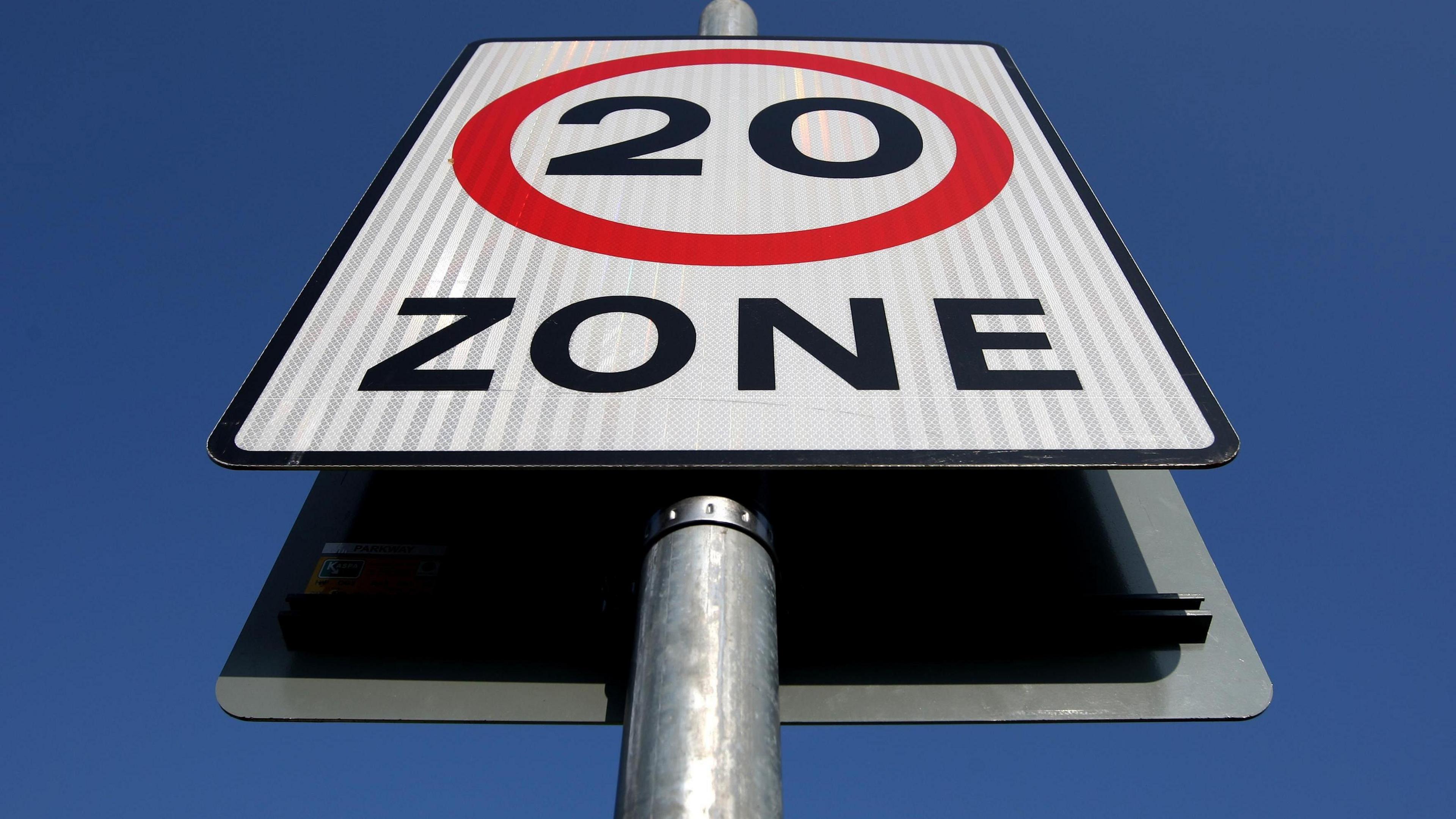Will all of Scotland's streets have 20mph limits?

Most of Scotland's urban roads will drop to 20mph limits by 2025.
- Published
Plans to drop the speed limit on most of Scotland's urban roads to 20mph are to be introduced by 2025.
Transport minister Fiona Hyslop confirmed the move at a road safety conference in Edinburgh on Thursday.
Lower limits are already in place in parts of the capital, Glasgow, the Highlands and Scottish Borders.
The move will bring Scotland in line with Wales, which became the first in the UK to introduce a 20mph limit in September.
'Safer streets'
Ms Hyslop confirmed the rollout at the 20’s Plenty for Scotland conference.
The policy was included in the SNP programme for government as part of the Bute House agreement with the Scottish Greens.
It states that all "appropriate roads in built-up areas will have a safer speed limit of 20mph by 2025".
The Greens transport spokesman, Mark Ruskell, brought a Members Bill on the issue forward in 2018 which was ultimately rejected after a vote in the Scottish Parliament.
He said the move would make Scotland's roads safer and reduce casualties.
Wales first UK nation to drop speed limit from 30mph
- Published17 September 2023
Borders 20mph speed limit move made permanent
- Published12 January 2023
Mr Ruskell said: "Widespread 20mph limits are already in place in the Highlands, Edinburgh, Glasgow and other parts of our country. I want to see it rolled out all over Scotland, saving lives and giving us safer streets and communities.
“Introducing 20mph speed limits is the simplest, quickest and cheapest way to reduce casualties, and I am delighted to be working with Scottish Greens in government and with campaigners and local authorities to support this vital work.
“Quietly across Scotland, our communities are changing for the better and becoming safer, greener and cleaner, with safer 20mph speed limits, a ban on pavement parking and the introduction of low-emission zones.”
'The Reducer'
City of Edinburgh Council became the first local authority in Scotland to implement lower speeds city-wide.
The scheme - which even had it own mascot, named The Reducer - was rolled out incrementally between 2016 and 2018.
Around 86% of the city's roads are now covered by the 20mph zone.
Research by the Universities of Edinburgh, Cambridge, East Anglia, St Andrews and Bristol and Queen’s University Belfast, in association with transport charity charity Sustrans found it had cut road deaths by almost a quarter and serious injuries by a third.
According to the report, published in September 2022, the number of collisions in one year fell by 40% to 367, and there were 409 fewer casualties.
Fatalities, meanwhile, dropped by 23% and serious injuries fell by 33%.
A consultation now seeks to extend the 20mph zone to cover 90% of the capital's roads.
Allow X content?
This article contains content provided by X. We ask for your permission before anything is loaded, as they may be using cookies and other technologies. You may want to read X’s cookie policy, external and privacy policy, external before accepting. To view this content choose ‘accept and continue’.
Edinburgh's transport convener, Scott Arthur, admitted the scheme had been controversial but said the majority of motorists had accepted the new limits.
He said: “Edinburgh set a precedent in 2015 by agreeing to become Scotland’s first 20mph city.
"This was hugely controversial at the time, but few people in Edinburgh today would argue that their street should revert to 30mph.
“Since then, the benefits have been clear – as well as safer speeds, casualties have also reduced, which is exactly what we’re trying to achieve.
"Last year, independent research showed that the number of collisions has fallen by 30%, and the number of injuries has dropped by a similar amount."
'War on motorists'
Scottish Borders Council sought to follow suit with a permanent 20mph zone across the region in January of this year.
It said a two-year pilot had produced "clear and obvious safety benefits".
But the move provoked a strong reaction from local motorists.
An online consultation on the move was forced offline last year due the abuse received.
Meanwhile, the Welsh scheme was backed by the United Nations, but attracted criticism from the leader of the House of Commons, Penny Mordaunt, among others.
The Welsh Conservatives described the rollout, which covers around 35% of Wales' roads, as "frankly ludicrous and a war on motorists".
Signs signalling the new limit have also been graffitied, damaged or stolen altogether.
Scottish Conservative shadow transport minister Graham Simpson said the planned rollout was a "blunt instrument".
He said: “There are places where a 20mph zone is prudent and desirable – the areas near schools being the prime example.
"But the decision on where those should be is best made by local communities.
“It's not clear a blanket prohibition in all urban areas is would always be appropriate.
"This is a policy that would be best determined in consultation with those who will be affected, rather than by some centralised diktat from SNP ministers.”